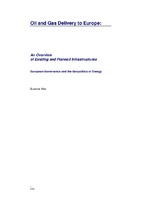Oil and Gas Delivery to Europe: An Overview of Existing and Planned Infrastructures. European Governance and the Geopolitics of Energy

Report
Author
Nies, Susanne
Corporate name
European Commission / Directorate General for Energy and TransportDate
2008Subject headings
Geopolitics of Energy ; EuropeAbstract
The European Union’s hydrocarbon energy supply depends heavily
on imports. While the European Commission has recommended
diversifying and increasing domestic resources, notably with
renewable resources which should grow to 20% by 2020,
dependence on hydrocarbon imports will remain not only important,
but will increase.
Particular attention must thus be paid to the question of
transportation, and also to the countries of origin, investments in
infrastructure, their protection, relations with transit countries,
‘competing consumers’-notably China and emerging countries, but
also the United States-, energy wastefulness in producing countries,
and finally, price. Security of supply depends on adequate and
reliable infrastructure, and must always be thought of in the longterm.
This fourth study conducted by the European Governance and
Geopolitics of Energy program at IFRI includes discussions about
pipeline routes and potential outputs, their current use and the
financial requirements for transportation, on-going projects and those
planned for the future, their cost, their financing, and their probable
operational start-up date. While all infrastructures are necessarily
included (including Norway, the United Kingdom, and North Africa),
particular attention is paid to transportation infrastructure that
connects Europe with Russia and the former Soviet Union (Central
Asia, Caspian Sea). One will quickly understand that the issue of gas
is dominant in today’s discussions.
